ACT145 Managerial Accounting Project: Ethics and Governance in Oman
VerifiedAdded on 2023/06/04
|7
|1377
|434
Project
AI Summary
This project provides an overview of corporate governance, corporate social responsibility (CSR) initiatives, and ethical values in managerial accounting practices within the context of Oman. It highlights the importance of corporate governance in promoting accountability, transparency, and preventing financial irregularities. The project discusses CSR initiatives undertaken by firms in Oman, focusing on community development, environmental sustainability, and safety. It also emphasizes the ethical codes of conduct in managerial accounting, including interdependence, objectivity, integrity, confidentiality, and professional competency. The conclusion underscores the significance of managerial accounting and ethical standards in ensuring responsible business practices in Oman. This document is available on Desklib, a platform offering study tools and resources for students.
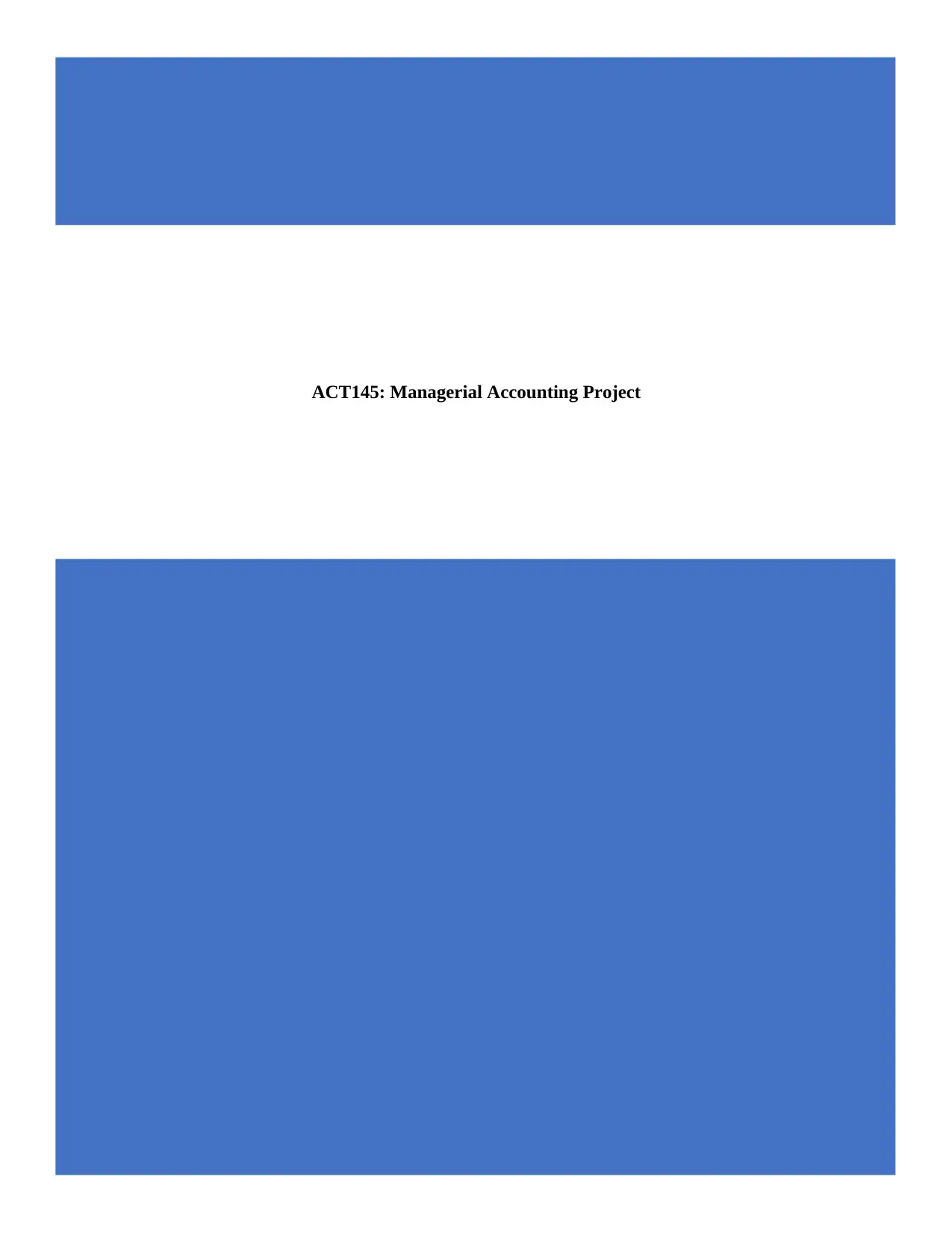
ACT145: Managerial Accounting Project
Paraphrase This Document
Need a fresh take? Get an instant paraphrase of this document with our AI Paraphraser
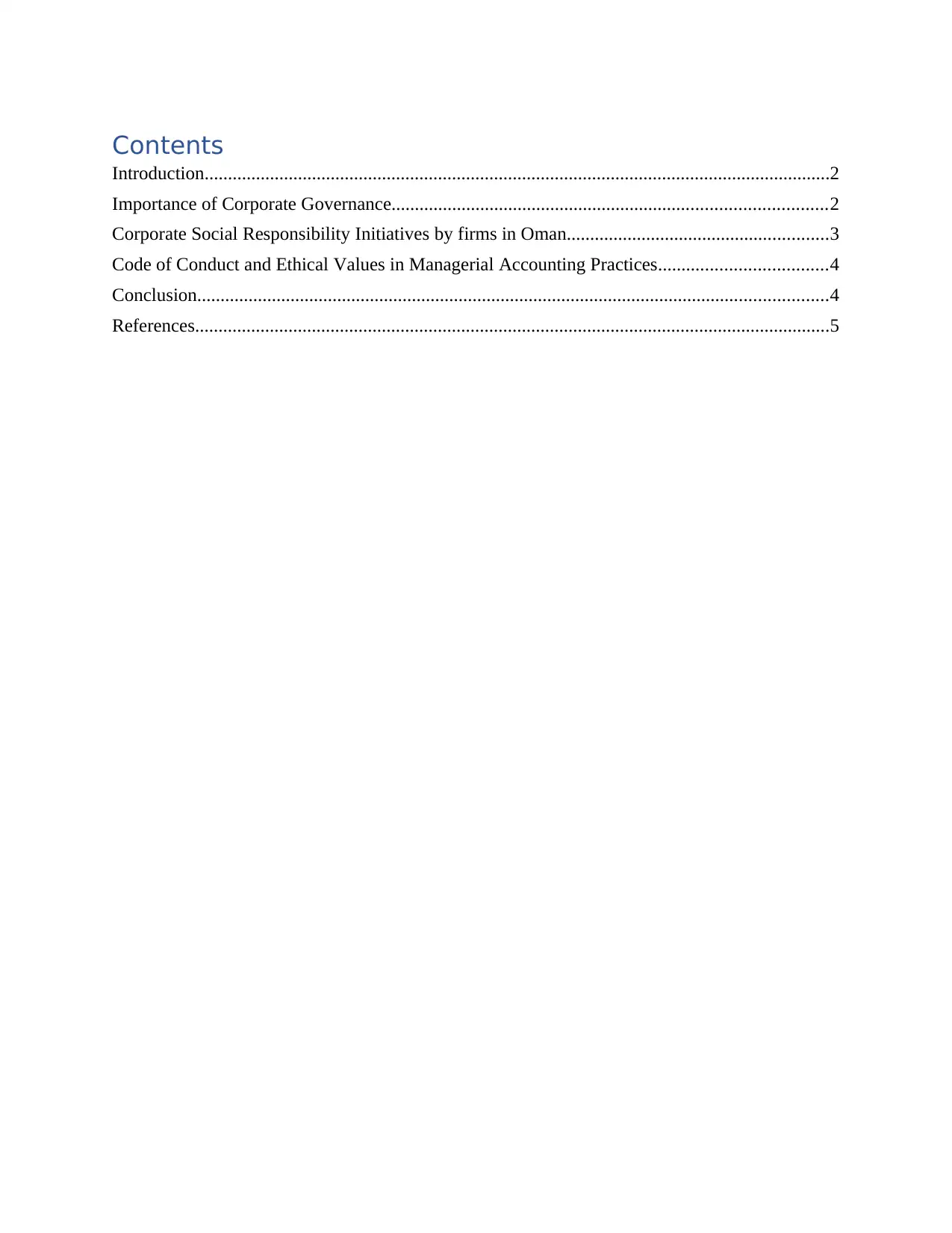
Contents
Introduction......................................................................................................................................2
Importance of Corporate Governance.............................................................................................2
Corporate Social Responsibility Initiatives by firms in Oman........................................................3
Code of Conduct and Ethical Values in Managerial Accounting Practices....................................4
Conclusion.......................................................................................................................................4
References........................................................................................................................................5
Introduction......................................................................................................................................2
Importance of Corporate Governance.............................................................................................2
Corporate Social Responsibility Initiatives by firms in Oman........................................................3
Code of Conduct and Ethical Values in Managerial Accounting Practices....................................4
Conclusion.......................................................................................................................................4
References........................................................................................................................................5
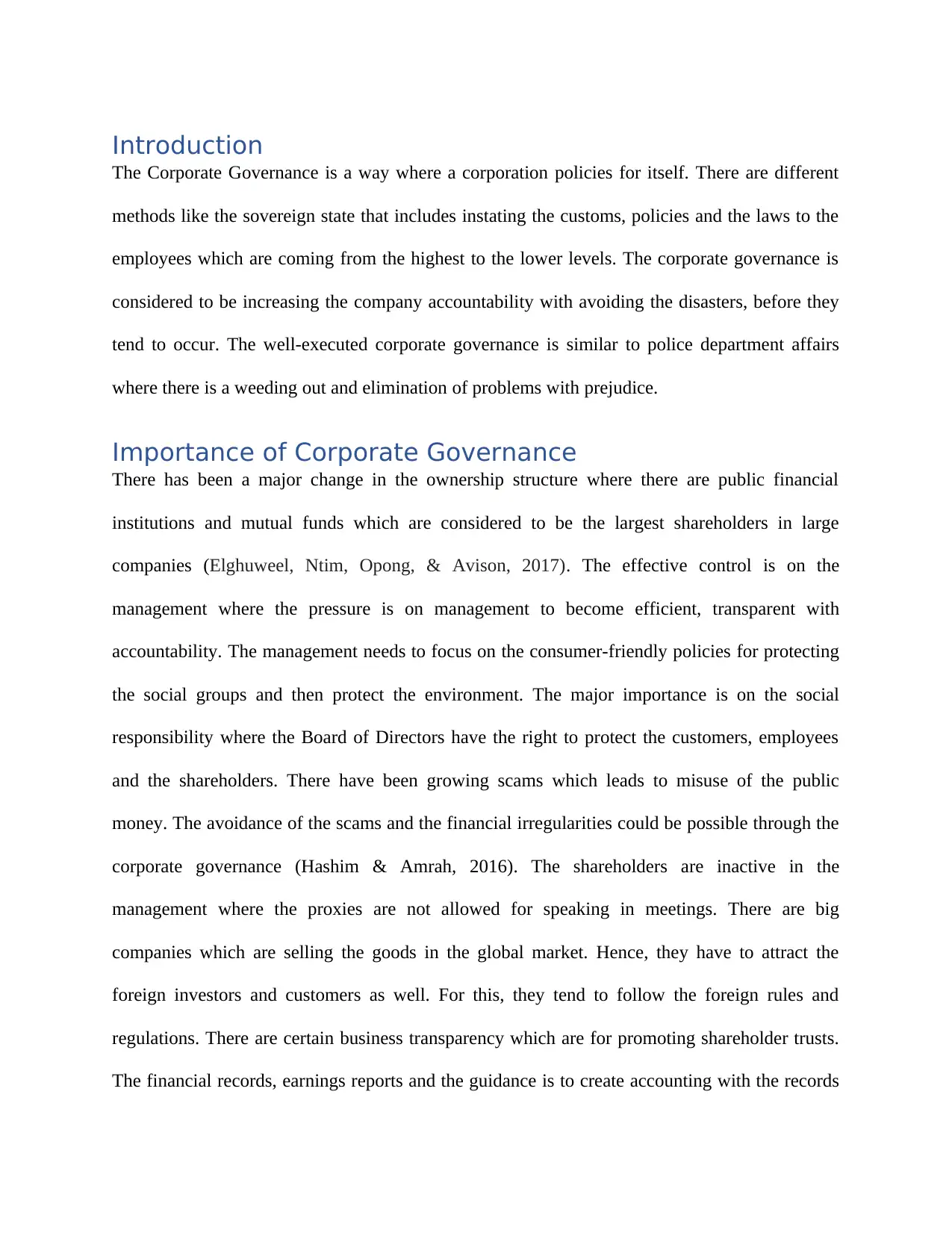
Introduction
The Corporate Governance is a way where a corporation policies for itself. There are different
methods like the sovereign state that includes instating the customs, policies and the laws to the
employees which are coming from the highest to the lower levels. The corporate governance is
considered to be increasing the company accountability with avoiding the disasters, before they
tend to occur. The well-executed corporate governance is similar to police department affairs
where there is a weeding out and elimination of problems with prejudice.
Importance of Corporate Governance
There has been a major change in the ownership structure where there are public financial
institutions and mutual funds which are considered to be the largest shareholders in large
companies (Elghuweel, Ntim, Opong, & Avison, 2017). The effective control is on the
management where the pressure is on management to become efficient, transparent with
accountability. The management needs to focus on the consumer-friendly policies for protecting
the social groups and then protect the environment. The major importance is on the social
responsibility where the Board of Directors have the right to protect the customers, employees
and the shareholders. There have been growing scams which leads to misuse of the public
money. The avoidance of the scams and the financial irregularities could be possible through the
corporate governance (Hashim & Amrah, 2016). The shareholders are inactive in the
management where the proxies are not allowed for speaking in meetings. There are big
companies which are selling the goods in the global market. Hence, they have to attract the
foreign investors and customers as well. For this, they tend to follow the foreign rules and
regulations. There are certain business transparency which are for promoting shareholder trusts.
The financial records, earnings reports and the guidance is to create accounting with the records
The Corporate Governance is a way where a corporation policies for itself. There are different
methods like the sovereign state that includes instating the customs, policies and the laws to the
employees which are coming from the highest to the lower levels. The corporate governance is
considered to be increasing the company accountability with avoiding the disasters, before they
tend to occur. The well-executed corporate governance is similar to police department affairs
where there is a weeding out and elimination of problems with prejudice.
Importance of Corporate Governance
There has been a major change in the ownership structure where there are public financial
institutions and mutual funds which are considered to be the largest shareholders in large
companies (Elghuweel, Ntim, Opong, & Avison, 2017). The effective control is on the
management where the pressure is on management to become efficient, transparent with
accountability. The management needs to focus on the consumer-friendly policies for protecting
the social groups and then protect the environment. The major importance is on the social
responsibility where the Board of Directors have the right to protect the customers, employees
and the shareholders. There have been growing scams which leads to misuse of the public
money. The avoidance of the scams and the financial irregularities could be possible through the
corporate governance (Hashim & Amrah, 2016). The shareholders are inactive in the
management where the proxies are not allowed for speaking in meetings. There are big
companies which are selling the goods in the global market. Hence, they have to attract the
foreign investors and customers as well. For this, they tend to follow the foreign rules and
regulations. There are certain business transparency which are for promoting shareholder trusts.
The financial records, earnings reports and the guidance is to create accounting with the records
⊘ This is a preview!⊘
Do you want full access?
Subscribe today to unlock all pages.

Trusted by 1+ million students worldwide
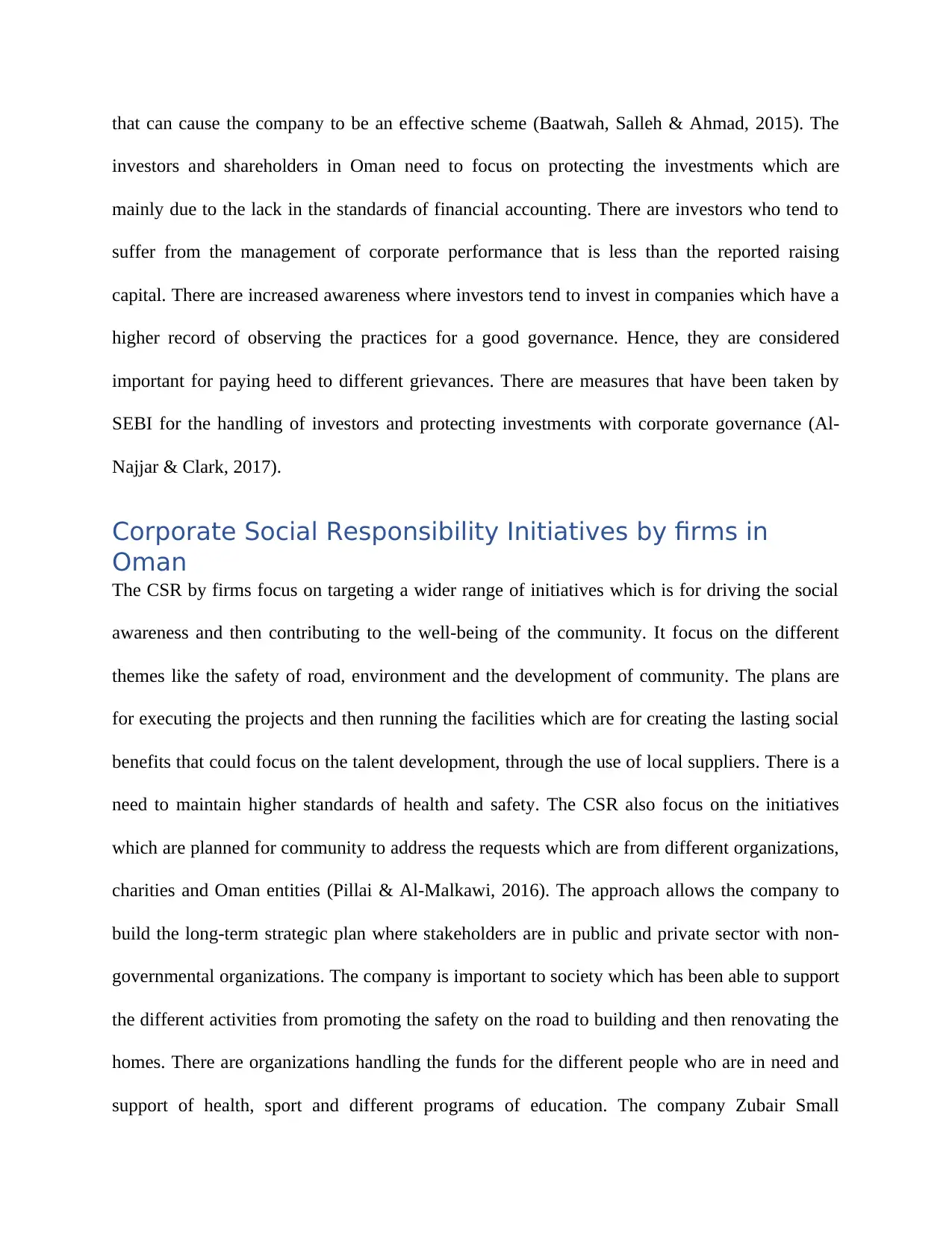
that can cause the company to be an effective scheme (Baatwah, Salleh & Ahmad, 2015). The
investors and shareholders in Oman need to focus on protecting the investments which are
mainly due to the lack in the standards of financial accounting. There are investors who tend to
suffer from the management of corporate performance that is less than the reported raising
capital. There are increased awareness where investors tend to invest in companies which have a
higher record of observing the practices for a good governance. Hence, they are considered
important for paying heed to different grievances. There are measures that have been taken by
SEBI for the handling of investors and protecting investments with corporate governance (Al-
Najjar & Clark, 2017).
Corporate Social Responsibility Initiatives by firms in
Oman
The CSR by firms focus on targeting a wider range of initiatives which is for driving the social
awareness and then contributing to the well-being of the community. It focus on the different
themes like the safety of road, environment and the development of community. The plans are
for executing the projects and then running the facilities which are for creating the lasting social
benefits that could focus on the talent development, through the use of local suppliers. There is a
need to maintain higher standards of health and safety. The CSR also focus on the initiatives
which are planned for community to address the requests which are from different organizations,
charities and Oman entities (Pillai & Al-Malkawi, 2016). The approach allows the company to
build the long-term strategic plan where stakeholders are in public and private sector with non-
governmental organizations. The company is important to society which has been able to support
the different activities from promoting the safety on the road to building and then renovating the
homes. There are organizations handling the funds for the different people who are in need and
support of health, sport and different programs of education. The company Zubair Small
investors and shareholders in Oman need to focus on protecting the investments which are
mainly due to the lack in the standards of financial accounting. There are investors who tend to
suffer from the management of corporate performance that is less than the reported raising
capital. There are increased awareness where investors tend to invest in companies which have a
higher record of observing the practices for a good governance. Hence, they are considered
important for paying heed to different grievances. There are measures that have been taken by
SEBI for the handling of investors and protecting investments with corporate governance (Al-
Najjar & Clark, 2017).
Corporate Social Responsibility Initiatives by firms in
Oman
The CSR by firms focus on targeting a wider range of initiatives which is for driving the social
awareness and then contributing to the well-being of the community. It focus on the different
themes like the safety of road, environment and the development of community. The plans are
for executing the projects and then running the facilities which are for creating the lasting social
benefits that could focus on the talent development, through the use of local suppliers. There is a
need to maintain higher standards of health and safety. The CSR also focus on the initiatives
which are planned for community to address the requests which are from different organizations,
charities and Oman entities (Pillai & Al-Malkawi, 2016). The approach allows the company to
build the long-term strategic plan where stakeholders are in public and private sector with non-
governmental organizations. The company is important to society which has been able to support
the different activities from promoting the safety on the road to building and then renovating the
homes. There are organizations handling the funds for the different people who are in need and
support of health, sport and different programs of education. The company Zubair Small
Paraphrase This Document
Need a fresh take? Get an instant paraphrase of this document with our AI Paraphraser
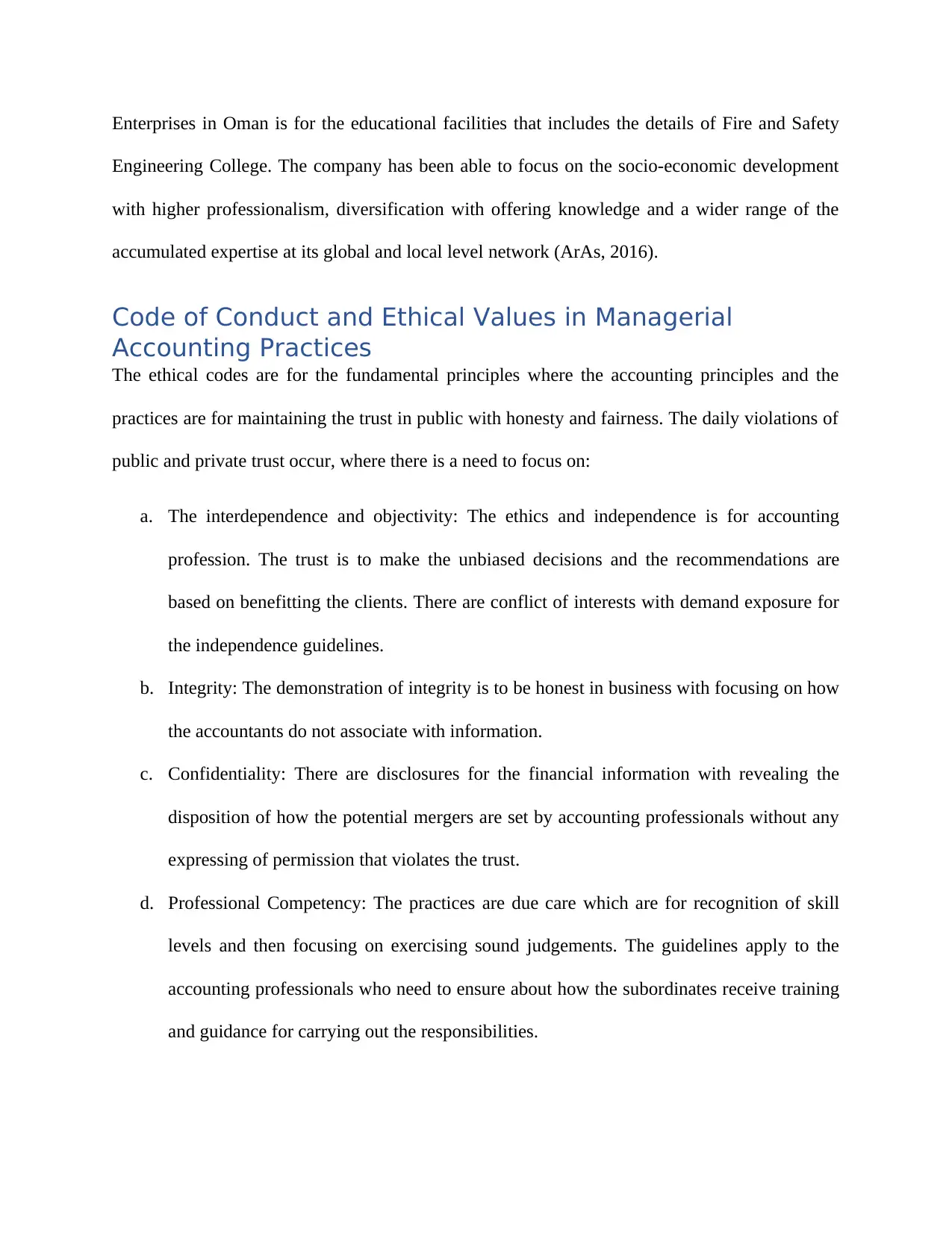
Enterprises in Oman is for the educational facilities that includes the details of Fire and Safety
Engineering College. The company has been able to focus on the socio-economic development
with higher professionalism, diversification with offering knowledge and a wider range of the
accumulated expertise at its global and local level network (ArAs, 2016).
Code of Conduct and Ethical Values in Managerial
Accounting Practices
The ethical codes are for the fundamental principles where the accounting principles and the
practices are for maintaining the trust in public with honesty and fairness. The daily violations of
public and private trust occur, where there is a need to focus on:
a. The interdependence and objectivity: The ethics and independence is for accounting
profession. The trust is to make the unbiased decisions and the recommendations are
based on benefitting the clients. There are conflict of interests with demand exposure for
the independence guidelines.
b. Integrity: The demonstration of integrity is to be honest in business with focusing on how
the accountants do not associate with information.
c. Confidentiality: There are disclosures for the financial information with revealing the
disposition of how the potential mergers are set by accounting professionals without any
expressing of permission that violates the trust.
d. Professional Competency: The practices are due care which are for recognition of skill
levels and then focusing on exercising sound judgements. The guidelines apply to the
accounting professionals who need to ensure about how the subordinates receive training
and guidance for carrying out the responsibilities.
Engineering College. The company has been able to focus on the socio-economic development
with higher professionalism, diversification with offering knowledge and a wider range of the
accumulated expertise at its global and local level network (ArAs, 2016).
Code of Conduct and Ethical Values in Managerial
Accounting Practices
The ethical codes are for the fundamental principles where the accounting principles and the
practices are for maintaining the trust in public with honesty and fairness. The daily violations of
public and private trust occur, where there is a need to focus on:
a. The interdependence and objectivity: The ethics and independence is for accounting
profession. The trust is to make the unbiased decisions and the recommendations are
based on benefitting the clients. There are conflict of interests with demand exposure for
the independence guidelines.
b. Integrity: The demonstration of integrity is to be honest in business with focusing on how
the accountants do not associate with information.
c. Confidentiality: There are disclosures for the financial information with revealing the
disposition of how the potential mergers are set by accounting professionals without any
expressing of permission that violates the trust.
d. Professional Competency: The practices are due care which are for recognition of skill
levels and then focusing on exercising sound judgements. The guidelines apply to the
accounting professionals who need to ensure about how the subordinates receive training
and guidance for carrying out the responsibilities.
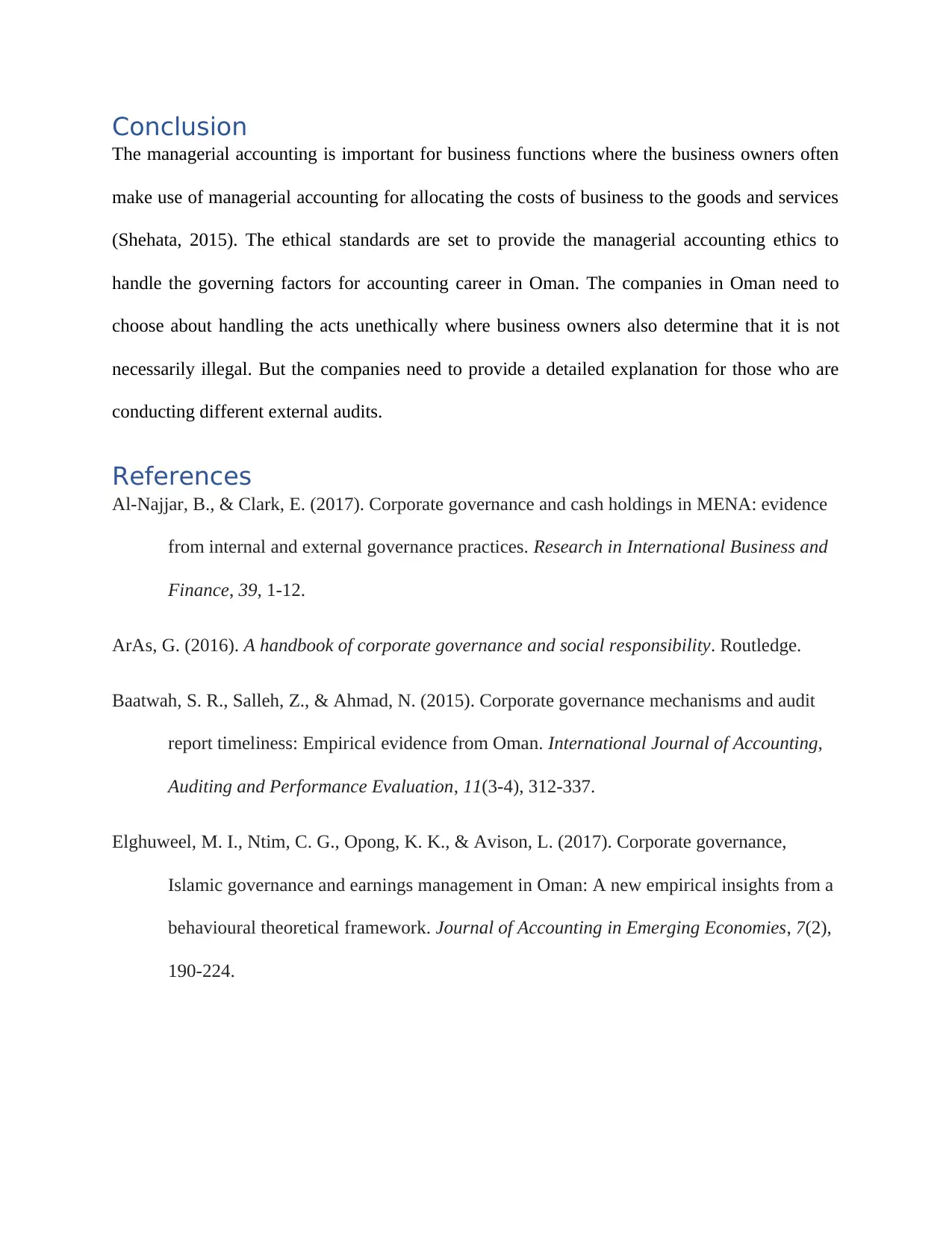
Conclusion
The managerial accounting is important for business functions where the business owners often
make use of managerial accounting for allocating the costs of business to the goods and services
(Shehata, 2015). The ethical standards are set to provide the managerial accounting ethics to
handle the governing factors for accounting career in Oman. The companies in Oman need to
choose about handling the acts unethically where business owners also determine that it is not
necessarily illegal. But the companies need to provide a detailed explanation for those who are
conducting different external audits.
References
Al-Najjar, B., & Clark, E. (2017). Corporate governance and cash holdings in MENA: evidence
from internal and external governance practices. Research in International Business and
Finance, 39, 1-12.
ArAs, G. (2016). A handbook of corporate governance and social responsibility. Routledge.
Baatwah, S. R., Salleh, Z., & Ahmad, N. (2015). Corporate governance mechanisms and audit
report timeliness: Empirical evidence from Oman. International Journal of Accounting,
Auditing and Performance Evaluation, 11(3-4), 312-337.
Elghuweel, M. I., Ntim, C. G., Opong, K. K., & Avison, L. (2017). Corporate governance,
Islamic governance and earnings management in Oman: A new empirical insights from a
behavioural theoretical framework. Journal of Accounting in Emerging Economies, 7(2),
190-224.
The managerial accounting is important for business functions where the business owners often
make use of managerial accounting for allocating the costs of business to the goods and services
(Shehata, 2015). The ethical standards are set to provide the managerial accounting ethics to
handle the governing factors for accounting career in Oman. The companies in Oman need to
choose about handling the acts unethically where business owners also determine that it is not
necessarily illegal. But the companies need to provide a detailed explanation for those who are
conducting different external audits.
References
Al-Najjar, B., & Clark, E. (2017). Corporate governance and cash holdings in MENA: evidence
from internal and external governance practices. Research in International Business and
Finance, 39, 1-12.
ArAs, G. (2016). A handbook of corporate governance and social responsibility. Routledge.
Baatwah, S. R., Salleh, Z., & Ahmad, N. (2015). Corporate governance mechanisms and audit
report timeliness: Empirical evidence from Oman. International Journal of Accounting,
Auditing and Performance Evaluation, 11(3-4), 312-337.
Elghuweel, M. I., Ntim, C. G., Opong, K. K., & Avison, L. (2017). Corporate governance,
Islamic governance and earnings management in Oman: A new empirical insights from a
behavioural theoretical framework. Journal of Accounting in Emerging Economies, 7(2),
190-224.
⊘ This is a preview!⊘
Do you want full access?
Subscribe today to unlock all pages.

Trusted by 1+ million students worldwide
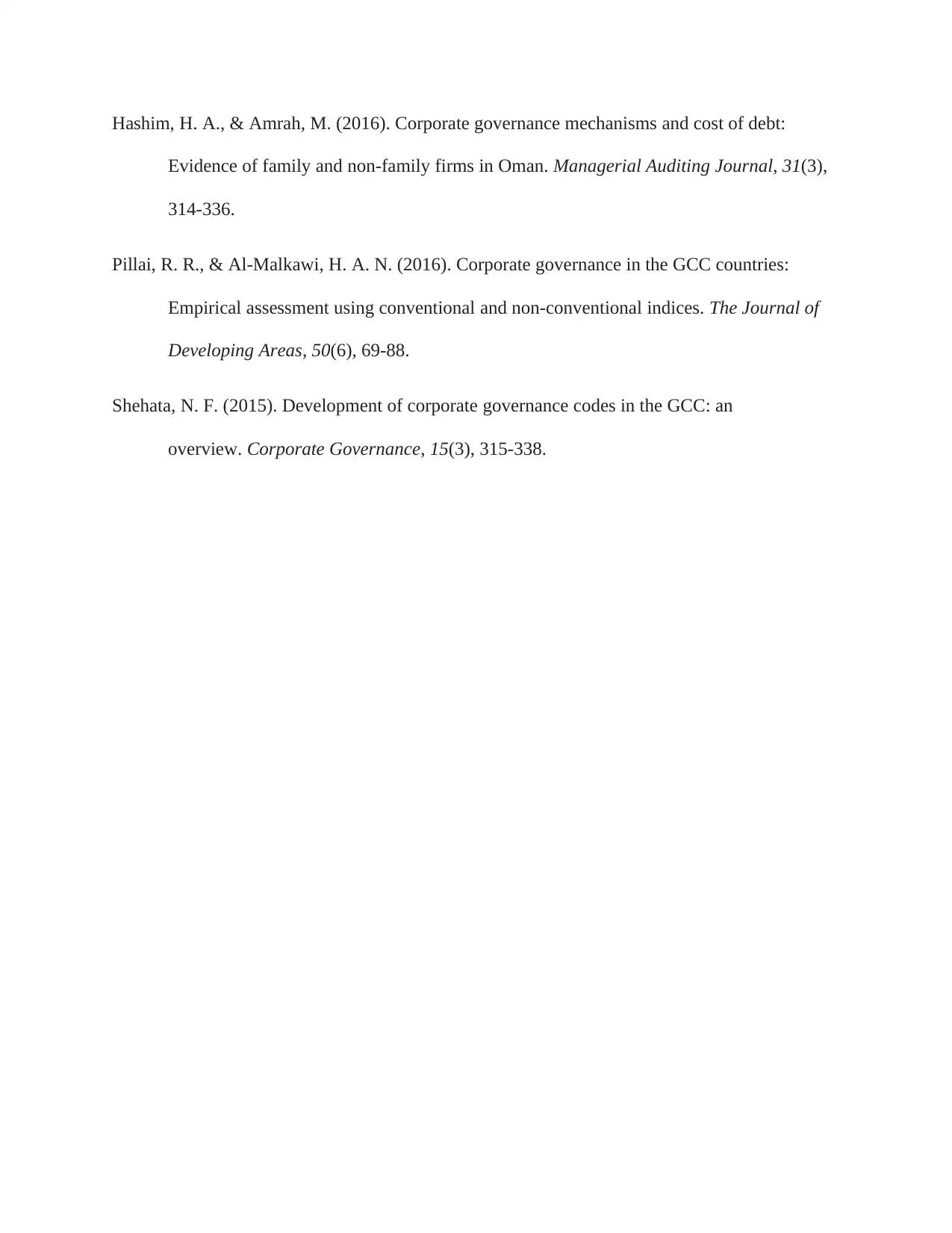
Hashim, H. A., & Amrah, M. (2016). Corporate governance mechanisms and cost of debt:
Evidence of family and non-family firms in Oman. Managerial Auditing Journal, 31(3),
314-336.
Pillai, R. R., & Al-Malkawi, H. A. N. (2016). Corporate governance in the GCC countries:
Empirical assessment using conventional and non-conventional indices. The Journal of
Developing Areas, 50(6), 69-88.
Shehata, N. F. (2015). Development of corporate governance codes in the GCC: an
overview. Corporate Governance, 15(3), 315-338.
Evidence of family and non-family firms in Oman. Managerial Auditing Journal, 31(3),
314-336.
Pillai, R. R., & Al-Malkawi, H. A. N. (2016). Corporate governance in the GCC countries:
Empirical assessment using conventional and non-conventional indices. The Journal of
Developing Areas, 50(6), 69-88.
Shehata, N. F. (2015). Development of corporate governance codes in the GCC: an
overview. Corporate Governance, 15(3), 315-338.
1 out of 7
Related Documents
Your All-in-One AI-Powered Toolkit for Academic Success.
+13062052269
info@desklib.com
Available 24*7 on WhatsApp / Email
![[object Object]](/_next/static/media/star-bottom.7253800d.svg)
Unlock your academic potential
Copyright © 2020–2026 A2Z Services. All Rights Reserved. Developed and managed by ZUCOL.





